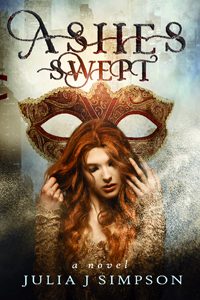
Julia J Simpson makes the case for first person POV
First-person point of view or third-person point of view (POV) – which do you prefer and why? Conscious of a dislike of first-person POV in certain quarters, indie author Julia J Simpson, who writes speculative romantic novels, makes a strong case for first-person.
There are few topics that inspire a more spirited debate among writers than writing in first-person point of view. I've been writing first-person stories since 2009, and I used it in my debut novel, Ashes Swept, so it's a topic I'm very familiar with.
I genuinely believe some of the vehement dislike of first-person POV is rooted in misconception and a few bad experiences. If you'll lend me your ear for a moment, I'd like to address some of those misconceptions and see if I can help set the record straight.

5 Misconceptions about First-Person Point of View
- First-person is only popular in Young Adult fiction, and that's where it should stay.
It's true that there are a lot of popular YA novels written in first-person point of view, but to say it's only popular in YA is to dismiss numerous popular literary and adult novels also written in first-person. Chuck Palahniuk's Fight Club, F. Scott Fitzgerald's The Great Gatsby, much of Herman Melville's Moby Dick, Sylvia Plath's The Bell Jar… you get the idea.
- You can't write literary-sounding prose in first-person.
Okay, I admit it's trickier to write literary-sounding prose in first-person, but it's far from impossible. In fact, there's plenty of room for deep observation, detailed description, and meaningful figures of speech inside a person's thoughts and inner monologue. The key is to make it sound like a casual observation and not an overwrought depiction.
- First-person is easier/harder to write than third-person.
We all have our strengths and preferences, but writing in first-person isn't globally easier or harder than writing in third-person. Like most things where writing is concerned, getting more comfortable and competent at writing either one is just a matter of learning and practice.
- First-person is the weaker perspective.
While first-person POV does have its limitations, there can be an incredible amount of power in only letting your reader see through the eyes of a single character. There's no way for them to see or know what the POV character can't see or know, and in the right story, that can be a mighty storytelling tool.
- First-person POV is the mark of an immature writer.
This is a generalization I've never understood, and can only guess it comes from limited experience with well-written first-person POV fiction. But is it fair to demonize all first-person fiction just because some of it is done poorly? If so, I've read a lot of bad third-person fiction, so maybe we should talk about that?
How to Write First-Person Point of View Well
So, if you want to write in first-person, what do you need to know to do it well? Here are some tips I've picked up over the years:
-

Julia J Simpson writes first-person POV in her novels
Create well-developed POV characters with strong interior lives to help foster a strong connection between the character and the reader.
- Avoid the laundry list of “I” actions, “I went to the door and opened it, then I peeked into the chilly darkness and shivered. I couldn't help but wonder if they'd ever arrive.” (Meep!)
- Go beyond the character's immediate thoughts about what they're seeing and experiencing. Give the character meaningful insights, and “show the math” so the reader can see how and why they arrived at those insights.
- Make sure not to neglect the thoughts and observations of the other characters. Those should still exist, you just have to let the characters convey them to the POV character in some way.
- Remember that your POV character is still telling a story just like any other narrator. Who might they be telling that story to? Sometimes it helps to keep that in mind.
- Don't just describe what the POV character is seeing, doing, and thinking. Find ways to really bring the reader into the story—make them feel things and make them think!
Since I tell stories about young women who challenge their roles and the expectations of the societies they live in, first-person will probably always be my favorite way to tell those stories.
First-person POV lets me and my readers explore the worlds of my characters through their own eyes, everything intimately filtered through their deepest thoughts, feelings, and observations.
While I may not have changed your mind if you're among those who vehemently dislike first-person POV, I hope that I've at least given you some food for thought and shown you that, in the right stories, it's a POV with a lot of merit.
OVER TO YOU Which point of view do you prefer to write in, and why?
First-person or third-person point-of-view (POV) - which you do prefer to write and why? @jjswrites makes her case for the former. What's your POV about POV? #ww #amwriting Share on XOTHER GREAT POSTS ABOUT WRITING CRAFT
From the ALLi Author Advice Center Archive





In writing first person, what is your suggestion about going from a novel to a sequel, without writing all the character descriptions over again?
Raymond Chandler was hardly writing “immature ” prose, nor was Arthur Conan Doyle, when they used first-person POV to create their iconic detectives and the indelible world around them.
It’s extraordinary that anyone would consider first person not literary – from The Bell Jar to Lolita, Gatsby to Jane Eyre some of the finest literary prose is first person.